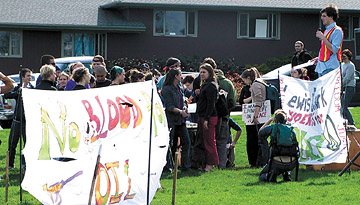War and Peace
Lewis & Clark College has encouraged a thoughtful dialogue on issues surrounding the recent war in Iraq.
“Most of our students barely remember the Persian Gulf War,” President Michael Mooney told the Oregonian. “And they certainly don’t remember Vietnam. So we had a special obligation to give them a theoretical framework to understand the issues. Then they can begin to make judgments about them.”
The following is a snapshot of events organized by Lewis & Clark students, faculty, and administrators in response to the conflict.

March 11: Campuswide Forum
As the war in Iraq appeared imminent and public debate intensified, President Mooney scheduled a half-day forum on war and peace in Pamplin Sports Center.
“While not every matter before our nation merits a concerted community discourse, this one does,” he said. “The point is not to settle the issues of war and peace but to inform the debates that surround them.”
The forum offered differing views on three broad questions: How did our world get to this point? Would this war be legally justified and politically effective? Is the war morally justified?
March 16: Candles for Peace
Mark Duntley, dean of the chapel, organized a candlelight vigil in Agnes Flanagan Chapel to provide the Lewis & Clark community and its neighbors a place for reflection, meditation, and prayer. The vigil coincided with similar gatherings worldwide. The chapel remained open and candles stayed lit throughout the war.
March 20: Student Walkout
On the day the U.S. government launched its “shock and awe” bombing campaign in Iraq, a number of students left classes and voiced their opinions at a rally near Akin residence hall. The walkout was coordinated by the Organization for Peace and Politics (OPP), a student group formed this academic year to encourage diverse views and actions on issues of war and injustice.
March 31-April 18: Lecture Series
As the war intensified, OPP members Leigh Halverson ’06 and Elana Guiney ’06 recognized that students wanted more information. They organized a 15-part lecture series titled “War and Peace: The Facts, the Issues, the Side Effects.” President Mooney began the discussion on March 18 with a talk on “Patriotism and Protest.” Three weeks later, Bob Mandel, professor of international affairs, wrapped up the series with a talk about safety and security in the modern world. In between, faculty members and other lecturers examined war through many lenses, including economics, music, philosophy, and religion. A candlelight procession to Agnes Flanagan Chapel followed each lecture.
More L&C Magazine Stories
Lewis & Clark Magazine is located in McAfee on the Undergraduate Campus.
MSC: 19
email magazine@lclark.edu
voice 503-768-7970
fax 503-768-7969
The L&C Magazine staff welcomes letters and emails from readers about topics covered in the magazine. Correspondence must include your name and location and may be edited.
Lewis & Clark Magazine
Lewis & Clark
615 S. Palatine Hill Road MSC 19
Portland OR 97219

